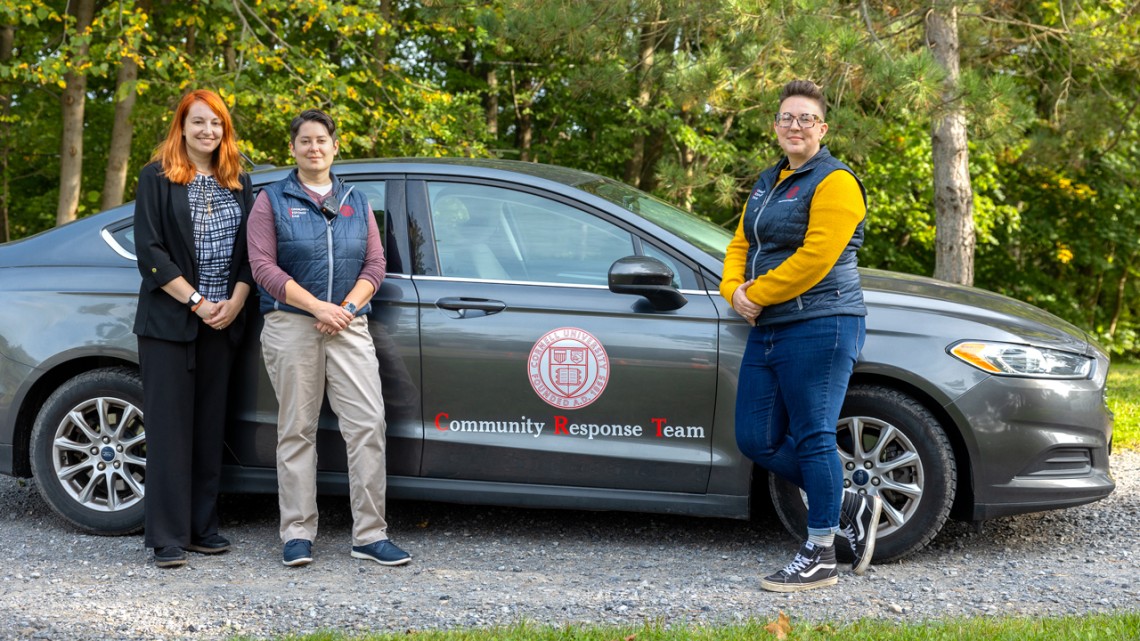
The Community Response Team (from left to right): Director Angaleen Trentanelli and Coordinators Jennifer Taylor and Kristina Petrella (not pictured: Brittanie Earle).
New response team supports students, reduces police intervention
By Caitlin Hayes, Cornell Chronicle
Students who find themselves in crisis outside business hours can now call on an alternative to law enforcement – a Community Response Team (CRT) that will send immediate, in-person support.
The four-person team, a part of Cornell’s new Division of Public Safety, aims to reduce the need for police response to nonviolent or noncriminal 911 crisis calls and to provide coverage when many support offices on campus are closed, with hours from 3 p.m. to 1 a.m., Thursday through Monday.
“Cornell has a ton of different in-person resources for students, but most of them function in that 9 a.m. to 5 p.m., Monday through Friday timeframe,” said Angaleen Trentanelli, new director of the CRT. “If students go into crisis or are struggling outside those hours, we can help them make a plan to get through that night or through the weekend and then get them connected with the services they need during normal business hours.”
Student and Campus Life ran a successful pilot of the CRT during the 2021-22 schoolyear; when the Division of Public Safety was established in 2022, it made sense to bring all first responders – such as the CRT, Cornell University Police Department (CUPD), and Cornell University Emergency Medical Services (CU-EMS) – under one roof, said David Honan, associate vice president for public safety.
“These teams work together seamlessly,” Honan said. “Sometimes police respond to a call, they get there and realize they’re not what’s needed. Now, they have someone within our team they can call, a group of professionals that can sit and work with the student, deescalate the situation and get them connected.”
Under the new division, the CRT’s jurisdiction has broadened – they can now respond to students, faculty or staff anywhere on Cornell property; previously, they served only on-campus residential communities. The current team has also used data from the pilot to modify its hours, providing coverage when the need is highest and some overlap between daytime and nighttime services to ensure continuity of care.
Students in distress can access the CRT by calling 911 or the Public Safety Communications Center at 607-255-1111, where calls will be routed to the appropriate response team. The CRT collaborates closely with the Public Safety Communications Center, CUPD, CU-EMS and Environment, Health and Safety to determine the best course of action during a crisis, and members have established close working relationships with Student and Campus Life, Housing and Residential Life and Counseling and Psychological Services, among other resources on and off campus.
Trentanelli is a licensed mental health counselor with multiple certifications and more than a decade of experience providing therapy to those suffering from mental illness, substance abuse and trauma; the three CRT coordinators, the team’s first responders, have expertise in community health and psychology, with extensive experience in victim advocacy and providing trauma-informed care to both children and adults.
CRT Coordinator Jennifer Taylor said the team can help in a wide range of situations.
“An interaction could certainly be something we might consider higher stakes, but it could also be as simple as a student feeling isolated and homesick and needing someone to talk to, or there may be students who are struggling with things they experienced prior to coming to campus, and they still need assistance processing it,” she said. “Regardless of the issue, we’re focused on ways to make sure students feel safe and supported. Everyone in our division has a primary goal of keeping the community safe, but we do go in with a different lens than our law enforcement partners in the ways we are trained to engage and support.”
The idea for an alternative response team came about after the nationwide protests following the murder of George Floyd in 2020; President Martha E. Pollack tasked Cornell’s Public Safety Advisory Committee with assessing and revising the university’s safety and security protocols, and one of its recommendations was an alternative community response model that reduced law enforcement’s intervention in nonviolent and noncriminal incidents.
“Obviously, we have policy and procedure that we follow, but we can take a more informal approach,” Trentanelli said. “We’re not in uniform, we’re trained to talk with people who are struggling. We’ll sometimes sit down on the floor with students; we’ll spend an hour talking with them, two hours even. It makes it easier to connect.”
“The people from CRT are not policy people, like me, they’re not Cornell Police,” said Julie Paige, director of off-campus and cooperative living for Student and Campus Life. “It gives students another layer of trust, which will make them more likely to use the CRT when they’re struggling.”
The team will continue to collect data and assess need and hopes to evolve to best serve the community for the long-term, Taylor said.
“Often students are still learning how to process their feelings, how to engage with others, how to recognize signs of healthy versus unhealthy relationships,” Taylor said. “All of these are really foundational building blocks. Hopefully we can step in and offer support in their journey, and skills and techniques that they can use later on, when they leave campus and go out into the wider world.”
Media Contact
Get Cornell news delivered right to your inbox.
Subscribe
